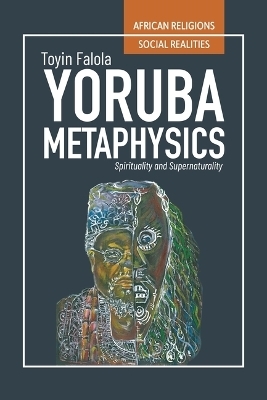
Yorùbá Metaphysics
Spirituality and Supernaturality
Seiten
2025
Ohio University Press (Verlag)
978-0-8214-2629-6 (ISBN)
Ohio University Press (Verlag)
978-0-8214-2629-6 (ISBN)
- Noch nicht erschienen (ca. April 2025)
- Versandkostenfrei innerhalb Deutschlands
- Auch auf Rechnung
- Verfügbarkeit in der Filiale vor Ort prüfen
- Artikel merken
Offering a fresh perspective on Yorùbá metaphysics and spirituality—and the roles these elements play in African communities—this comprehensive study contributes to the fields of philosophy, religious studies, and African studies by highlighting how indigenous epistemologies can inform broader discussions of ethics and societal development.
Yorùbá Metaphysics challenges Western dominance in the field of epistemology and sheds light on the sophisticated realm of indigenous African knowledge systems and metaphysical thought. Toyin Falola comprehensively explores the complex interplay between the physical and spiritual worlds as understood by the Yorùbá people, offering a fresh perspective on metaphysics, spirituality, and the societal roles these elements play in African communities. The book contributes to the fields of philosophy, religious studies, and African studies by revealing how indigenous epistemologies can inform broader discussions of metaphysics, ethics, and societal development that are outside the Western frame of thought.
Each of the book’s fifteen chapters focuses on a distinct aspect of Yorùbá life and cosmology. Topics encompass the everyday consequences of spiritual beliefs on social interactions and community living as well as the philosophical foundations that inform these practices. Noteworthy discussions include the function of language in conveying metaphysical knowledge, the societal impact of esoteric beliefs, and the application of these traditional understandings to contemporary life challenges. This work not only elucidates the nuances of Yorùbá metaphysical thought but also promotes the integration of this knowledge into broader academic and practical settings to advance societal development and sustainability.
As global discourse increasingly seeks to acknowledge and incorporate diverse viewpoints, this book provides essential insights into the workings of an African metaphysical philosophy and its relevance to both regional and international concerns. Falola urges the academic community to reconsider the value and role of indigenous knowledge systems in present-day education and policy formation. This work is vital for scholars, policymakers, and practitioners interested in cultural studies, philosophy, religious studies, and African studies. It is not merely a scholarly work; it is an appeal for a reassessment of the methods by which indigenous knowledge is viewed and applied on an international scale.
Yorùbá Metaphysics challenges Western dominance in the field of epistemology and sheds light on the sophisticated realm of indigenous African knowledge systems and metaphysical thought. Toyin Falola comprehensively explores the complex interplay between the physical and spiritual worlds as understood by the Yorùbá people, offering a fresh perspective on metaphysics, spirituality, and the societal roles these elements play in African communities. The book contributes to the fields of philosophy, religious studies, and African studies by revealing how indigenous epistemologies can inform broader discussions of metaphysics, ethics, and societal development that are outside the Western frame of thought.
Each of the book’s fifteen chapters focuses on a distinct aspect of Yorùbá life and cosmology. Topics encompass the everyday consequences of spiritual beliefs on social interactions and community living as well as the philosophical foundations that inform these practices. Noteworthy discussions include the function of language in conveying metaphysical knowledge, the societal impact of esoteric beliefs, and the application of these traditional understandings to contemporary life challenges. This work not only elucidates the nuances of Yorùbá metaphysical thought but also promotes the integration of this knowledge into broader academic and practical settings to advance societal development and sustainability.
As global discourse increasingly seeks to acknowledge and incorporate diverse viewpoints, this book provides essential insights into the workings of an African metaphysical philosophy and its relevance to both regional and international concerns. Falola urges the academic community to reconsider the value and role of indigenous knowledge systems in present-day education and policy formation. This work is vital for scholars, policymakers, and practitioners interested in cultural studies, philosophy, religious studies, and African studies. It is not merely a scholarly work; it is an appeal for a reassessment of the methods by which indigenous knowledge is viewed and applied on an international scale.
Toyin Falola is the Jacob and Sanger Mossiker Chair in the Humanities at the University of Texas at Austin. He also holds positions at the University of Pretoria and Lead City University. His books include Religious Beliefs and Knowledge Systems in Africa; African Spirituality, Politics, and Knowledge Systems: Sacred Words and Holy Realms; Decolonizing African Studies: Knowledge Production, Agency, And Voice; and Decolonizing African Knowledge: Autoethnography and African Epistemologies.
| Erscheint lt. Verlag | 22.4.2025 |
|---|---|
| Reihe/Serie | African Religions, Social Realities |
| Zusatzinfo | 18 images |
| Verlagsort | Athens |
| Sprache | englisch |
| Maße | 152 x 229 mm |
| Themenwelt | Geisteswissenschaften ► Philosophie ► Metaphysik / Ontologie |
| ISBN-10 | 0-8214-2629-X / 082142629X |
| ISBN-13 | 978-0-8214-2629-6 / 9780821426296 |
| Zustand | Neuware |
| Informationen gemäß Produktsicherheitsverordnung (GPSR) | |
| Haben Sie eine Frage zum Produkt? |
Mehr entdecken
aus dem Bereich
aus dem Bereich
eine philosophische Reise
Buch | Softcover (2024)
Goldmann (Verlag)
14,00 €
Auf dem Weg zu einer postkritischen Philosophie
Buch | Softcover (2023)
Suhrkamp (Verlag)
38,00 €


